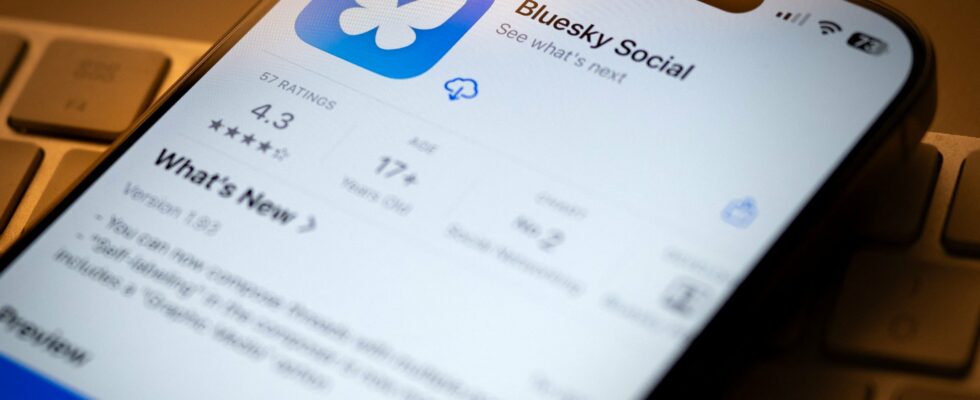It’s an unexpected little corner of blue sky for all “moderate” Internet users around the world. Since the election of Donald Trump on November 6, the social network Bluesky seems to have become the refuge for those nostalgic for those days when Twitter – now X – was not yet a collection of invectives, fake news and vulgarities. In recent days, Bluesky has reached the top of the rankings on the Apple App Store and Google Play Store, surpassing 20 million registered users on November 19. Compared to 4.9 million last February when it became accessible to all.
With a peak of one million new users – including a bunch from the ranks of the left and a handful of celebrities – registered in 24 hours, the platform announced on November 14, the day after the appointment of Elon Musk as “minister of government efficiency”. Although of course, the latest social network is still far from its rivals X (more than 600 million users) and Threads (more than 275 million, including 15 million new registrations in the month of November alone), the first having lost some 115,000 American subscribers the day after Donald Trump’s victory.
The majority of new registrants on Bluesky? Americans, Canadians and English. Designed as an alternative to experience as a computer engineer and the fact that she is in her early thirties -, has a sleek interface that looks exactly like the old Twitter. The blue baby bird has given way to a blue butterfly as a logo. The limit of 140 characters has been increased to 300.
A dive into the 2010 decade
For the rest, here we are plunged back into the 2010 decade, when Elon Musk was just one tweeter among millions of others and users were content to share articles, analyses, information, without insults. , untimely arrests, sweeping judgments and other celebrations. Just like X, Bluesky offers a feed of suggested accounts to follow, minus the hate algorithm. Gone is the parade of pseudo-parody accounts, extracts from TPMP (Touche pas à mon poste!), accounts linked to the extreme right and videos of attacks on individuals whose origins or causes we never really know. outcomes, indignation being the number 1 issue. Also in the closet are the racist accounts, the hideous ads and the skirmishes between “wannabes” pseudo-intellectuals. If you still come across a few posts that are a bit virulent, scrolling for about fifteen minutes on Bluesky will not give you nausea, nor the sudden desire to take a shower and even less the sudden desire to shoot down your next-door neighbor who don’t vote like you. “Bluesky is a haven for people who want a social media experience similar to what Twitter once offered, but without all the far-right activism, misinformation, hate speech, bots and everything else,” analyzes in the Guardian – who has just announced leaving X – social media specialist Axel Bruns. So it is with Eli McCann, humorous columnist for the Salt Lake Tribunewho enjoys in advance the happiness of “no longer being called a faggot every day by a guy who has never read a book”.
Going from It’s the pleasure of starting from scratch, with its imponderables. There you took 15 years to collect 3,000 followers, your Bluesky counter only shows 12 subscribers. The price to pay to regain algorithmic control of your life. We meet old acquaintances we met on X, with the same excitement as that of bumping into an old high school friend on a street corner. Collectively immersed in the era of “nowstalgia” described by sociologist Gérald Bronner, – “a desire for the present and the immediate past to mix to bring about or return a more desirable world” – we relearn how to talk to each other, to know each other, to share. We could all endorse the first message posted on Bluesky by billionaire entrepreneur Mark Cuban, 431,500 subscribers, on November 12: “Hello Less Hateful World”. One question remains: how many of us will join this blue sky? Does this social network have a future? Will advertisers follow? According to Jonathan Bellack, director of the Applied Social Media Lab at Harvard, interviewed by Business InsiderBluesky seems to have benefited in recent days from the “network effect” which triggers the click among potential users who are still reluctant to switch to a new digital platform. In other words, the more subscribers a social network gains, the more subscribers it is likely to obtain. According to the expert, “it seems that enough people have joined the site to reach a critical mass, which allows users not to feel that they are missing out on content on other platforms or that they are losing their online community by making the transition.
If tech experts temper the euphoria of the moment, warning against the possible Bluesky “bubble” and against the fact that X is not about to close shop, let’s not shy away from our pleasure, however fleeting it may be. And let’s not delude ourselves. “Whatever happens, Bluesky will never recreate Twitter 1.0, just as Threads cannot truly replace it,” Lance Ulanoff, editor-in-chief of the American version of TechRadar, wrote on November 14. Before concluding: “I know this won’t last, just like babies don’t stay cute. They become badly behaved children, then surly teenagers before becoming uninteresting adults. […] We should just enjoy this Bluesky moment — that’s what I’m doing — and maybe also start thinking about how to bring those experiences back into real life.”
.
